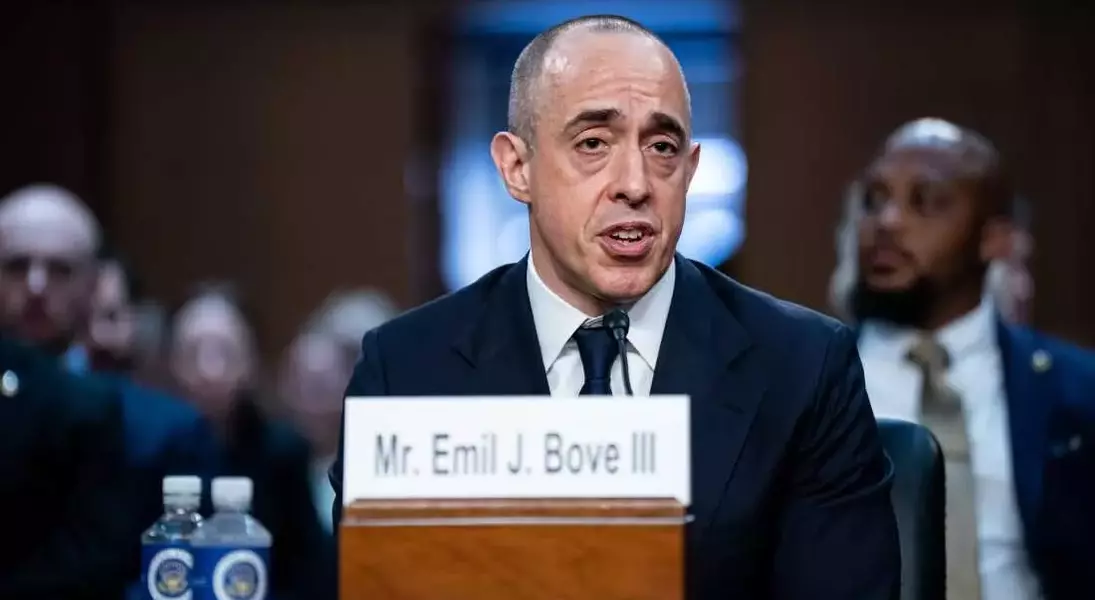
Judicial Crossroads: A Contentious Path to the Bench
Senate Committee Greenlights Controversial Judicial Pick
In a contentious session, the Senate Judiciary Committee's Republican members voted to endorse Emil Bove for a lifetime federal judgeship. Bove, previously a personal attorney for former President Trump, now sees his nomination move forward to a full Senate vote. All Democratic members of the committee staged a walkout, abstaining from the vote in protest.
The Nominee's Background and Allegations
Emil Bove, 44, has a background as a federal prosecutor in Manhattan and notably represented former President Trump in several criminal proceedings initiated by the Justice Department. His nomination to the U.S. Court of Appeals for the Third Circuit has been vigorously promoted by the White House. However, his professional record has drawn significant criticism from a wide array of legal professionals.
Widespread Opposition from Legal Community
Over 900 former Justice Department lawyers, spanning various political affiliations, alongside more than 75 retired state and federal judges, have voiced strong opposition to Bove's nomination. Their primary concern revolves around his perceived intense loyalty to the former president, which they fear could unduly influence his decisions on the bench. Critics suggest that Bove's past actions, particularly his involvement in aggressive legal strategies pursued by the Justice Department, raise questions about his commitment to impartial justice.
Whistleblower Claims and Denial
Central to the controversy are allegations from Erez Reuveni, a former DOJ lawyer, who claims Bove advised government attorneys to disregard court orders. Reuveni, who was terminated earlier this year, has provided supporting documentation, including text messages and emails. During his confirmation hearing, Bove denied these accusations, stating he was neither an \"enforcer\" nor a \"henchman\" and had never instructed subordinates to violate judicial mandates. He did, however, claim not to recall a specific incident where he allegedly suggested defying judges who obstructed White House directives on migrant deportations.
Concerns Over Judicial Independence
David Laufman, a former federal prosecutor, expressed alarm over Bove's potential confirmation, arguing that Bove has, at times, undermined the Justice Department by removing prosecutors and FBI agents involved in cases linked to the former president and the January 6 Capitol incident. Laufman contends that Bove's confirmation could lead to judicial outcomes that consistently favor the administration, potentially undermining the rule of law. Stacey Young, who heads Justice Connection, emphasized that the strength of the rule of law depends on the integrity of institutions like the DOJ and the judiciary, suggesting that elevating someone who has allegedly compromised one to a lifetime position on the other would be detrimental.
Senate Committee Chairman's Stance
Despite the grave allegations and requests from Democrats for further investigation into the whistleblower claims, Senate Judiciary Committee Chairman Chuck Grassley has dismissed them. He stated that a comprehensive review of the documents did not substantiate any misconduct by Bove. Grassley also implied that the timing of Reuveni's complaint, coinciding with Bove's confirmation hearing, might suggest a politically motivated attack.
Whistleblower's Defense and Confirmation Outlook
Dana Gold, senior counsel at the Government Accountability Project, defended the timing of Reuveni's complaint, asserting it was the culmination of months of meticulous work to navigate whistleblower procedures and ethical considerations, with the sole aim of revealing the truth. She emphasized the high relevance of this information to Bove's nomination, particularly concerning the perceived attempts by Justice Department leadership to prioritize political agendas over legal principles. Despite the ongoing controversy, Michael Fragoso, a former Republican Senate aide, predicts Bove's confirmation is likely, suggesting that Chairman Grassley would not have called for the vote without assurance of its passage along party lines.
